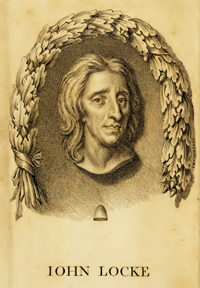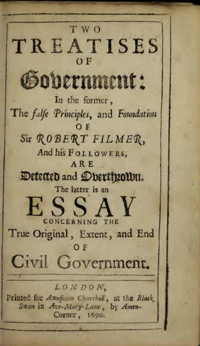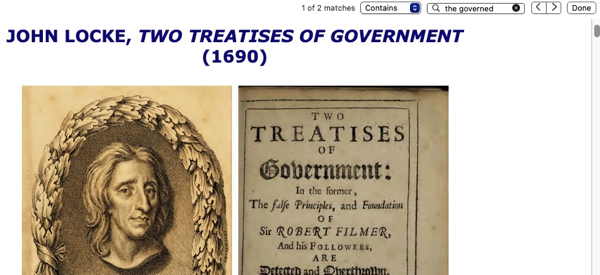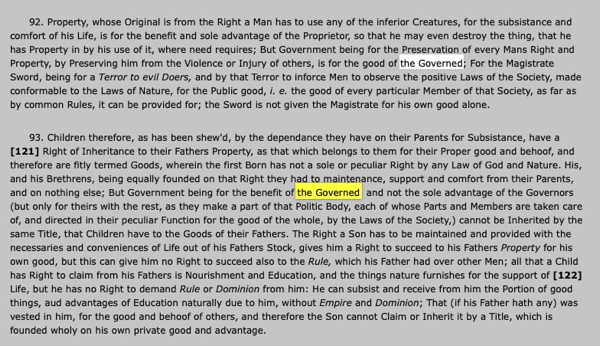
How to Use the "Citation Tool"
[Updated: 14 April, 2024 ]
The “Citation Tool” only works on texts which have the necessary code embedded in them, namely those texts which are part of the “Guillaumin Collection”.
These texts have been given unique paragraph ID numbers which are plucked out of the text by some clever Java script and packaged into a URL which links directly to that paragraph, and into a snippet of text which also contains the full bibliographic information about the book being cited.
 |
 |
| John Locke (1632-1704) |
I have chosen John Locke’s Two Treatises of Government (1690 ed.) as an example of how the "Citation Tool" works. Let us say we wish to cite the passage in which Locke talks about the purpose of government “being for the benefit of the Governed, and not the sole advantage of the Governors” [it comes from section 93 on p. 121 of the text, in Chap. VIII of Book I]. [Link]
The following are the steps required to find and cite this accurately:
1. Select the style of citation from the drop down menu at the top of page under the heading “Source”; this will structure the way the citation is formatted; the default setting is “MLA Style”; the other options are “APA Style” and “Turabian Style”

2. Do a word search within the text for the phrase “the governed” (there are 2); the second occurrence is the one we want to cite; it is in Locke’s section number 93, which in the online edition is coded as “<p class="section" id="TT-p105">93. Children therefore, as has been shew'd, by the …”

3. First locate and then copy and paste the text/phrase/passage you wish to cite into your notes; then you can get the URL or full citation of that text for reference purposes

4. To do this, click on the paragraph which has the text/phrase/passage you wish to cite in an article or paper (highlighted); this will reveal two icons to the left of that paragraph - an “anchor” and a “star”
![]()
4a. Clicking on the “anchor” icon will produce a pop-up window which contains the URL for a direct link to this paragraph, namely “http://davidmhart.com/liberty/EnglishClassicalLiberals/Locke/1690_Edition/index.html#TT-p105”; this can be copied and pasted for you to use in your article or paper
![]()
4b. Clicking on the “star” icon” will produce a pop-up window which contains the full bibliographical citation for this text and a link to this paragraph, in this case in MLA Style “John Locke, TWO TREATISES OF Government: In the former, The false Principles, and Foundation OF Sir ROBERT FILMER, And his FOLLOWERS, ARE Detected and Overthrown. The latter is an ESSAY CONCERNING THE True Original, Extent, and End OF Civil Government. LONDON, Printed for Awnsham Churchill, at the Black Swan in Ave-Mary-Lane, by Amen- Corner, 1690. 1/21/2023. http://davidmhart.com/liberty/EnglishClassicalLiberals/Locke/1690_Edition/index.html#TT-p105”; this can be copied and pasted for you to use in your article or paper.
![]()
The end result might be something like this is your article or paper on Lockean consent theory”:
In his discussion of the rights and duties of children and fathers in a family Locke makes a passing comment on the rights and duties of “the Governed” and “the Governors” which he would later expand into a full theory of consent in the second part of the book. He states that “But Government being for the benefit of the Governed, and not the sole advantage of the Governors … cannot be Inherited by the same Title, that Children have to the Goods of their Fathers.” [Footnote: John Locke, Two Treatises of Government (1690 edition), Section 93, p. 121. Online at <http://davidmhart.com/liberty/EnglishClassicalLiberals/Locke/1690_Edition/index.html#TT-p105>[Link]; visited on 1/21/2023.